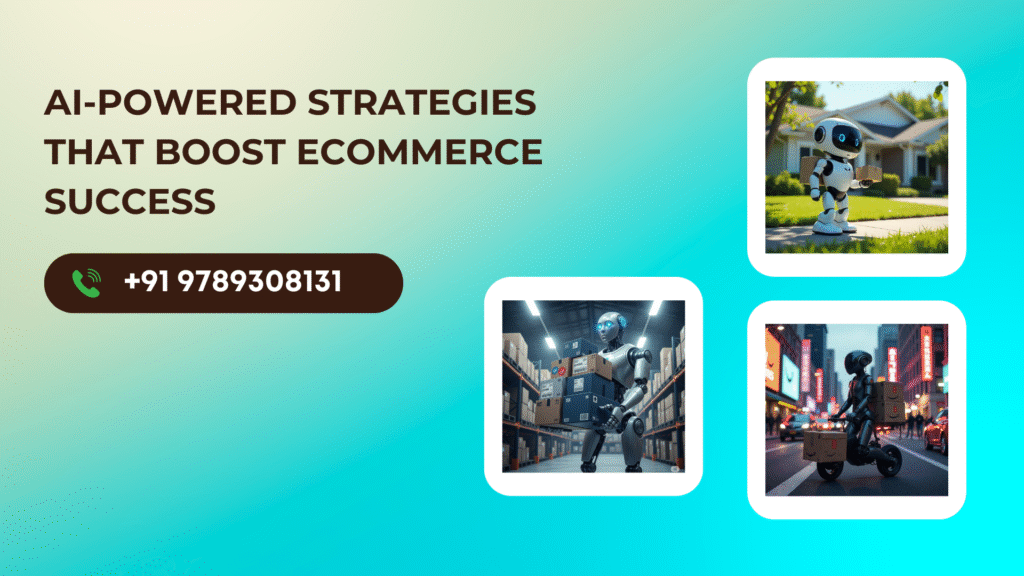Artificial intelligence (AI) is revolutionizing eCommerce, reshaping how businesses engage customers, optimize operations, and drive sales. From personalized shopping experiences to automated customer service, AI is no longer a luxury—it’s a competitive necessity.
The numbers speak for themselves. The AI in eCommerce market is projected to reach $22.6 billion by 2032, growing at a 14.6% CAGR. This explosive growth reflects AI’s undeniable impact on the industry.
Businesses leveraging AI are seeing 10–12% higher revenue on average, with profitability expected to surge by 59% by 2035. These gains come from smarter decision-making, automation, and hyper-targeted marketing.
Beyond revenue, AI is transforming the entire shopping journey. It powers personalized recommendations, chatbots, demand forecasting, and dynamic pricing, enhancing both customer satisfaction and operational efficiency.
As AI adoption accelerates, eCommerce stores that embrace it now will gain a long-term edge. The future of retail is intelligent—and the time to act is today.
10 Ways AI Gives eCommerce Stores a Competitive Edge
1. AI-Powered Personalization Boosts Sales & Retention
Imagine walking into a store where the salesperson knows exactly what you like. That’s what AI-powered personalization does for online shoppers. By analyzing browsing history, past purchases, and customer behavior, AI tailors product recommendations to individual preferences.
Studies show that 30% of eCommerce businesses already use AI for personalized recommendations, and the results are impressive. AI-driven suggestions increase sales by 59% and boost purchase rates by 30%. Customers love feeling understood, leading to 25–50% higher satisfaction rates.
Beyond product suggestions, AI enhances omnichannel personalization, ensuring a seamless experience across websites, emails, and mobile apps. Businesses using this approach see a 10–15% revenue lift from repeat customers.
The bottom line? AI-powered personalization isn’t just nice to have—it’s a must for boosting sales and keeping customers loyal.
2. AI Chatbots Enhance Customer Service & Efficiency
Long wait times and generic responses frustrate online shoppers. AI chatbots solve this by providing instant, 24/7 support. No wonder 80% of eCommerce businesses already use or plan to use them.
By 2030, chatbots will handle 80% of customer interactions, answering FAQs, tracking orders, and even processing returns. This instant support leads to 24–50% higher customer satisfaction.
A recent survey found that 61% of U.S. consumers prefer chatbots for quick answers. Instead of waiting on hold, shoppers get immediate help, improving their experience while reducing business costs.
For eCommerce stores, AI chatbots mean faster service, happier customers, and fewer support staff needed.
3. AI-Driven Demand Forecasting Reduces Costs
Running out of stock or over-ordering inventory hurts profits. AI solves this by predicting demand with incredible accuracy, cutting supply chain errors by 30–50%.
Using past sales data, market trends, and even weather forecasts, AI helps businesses optimize stock levels. Retailers use AI to automate restocking and streamline distribution, avoiding costly mistakes.
For example, AI can predict seasonal spikes, ensuring stores have enough products before demand surges. This prevents lost sales from stockouts and reduces waste from excess inventory.
The result? Lower costs, higher efficiency, and a smoother supply chain—all thanks to AI.
4. Dynamic Pricing Maximizes Revenue
Pricing products too high scares customers away, but pricing too low hurts profits. AI solves this with dynamic pricing, adjusting costs in real-time based on demand, competition, and trends.
Airlines and hotels have used this strategy for years, but now eCommerce stores are adopting it too. AI analyzes competitor prices, inventory levels, and buyer behavior to set the optimal price at the right time.
For example, during peak shopping hours, AI might slightly increase prices. If sales slow, it can offer discounts to boost demand. This keeps stores competitive while maximizing profits.
With AI-driven pricing, businesses no longer guess—they let data guide their strategy for higher revenue.
5. Visual Search & AR/VR Improve Shopping Experience
Ever struggled to describe an item in a search bar? AI-powered visual search lets shoppers upload images to find similar products instantly. This speeds up the buying process and improves accuracy.
Augmented and virtual reality (AR/VR) take it further by letting customers “try before they buy.” Furniture stores use AR to show how a couch looks in a room, while fashion brands let users virtually try on clothes.
These tools reduce return rates by helping shoppers make confident decisions. Brands using AI-powered visual tools see longer browsing sessions and higher conversions.
For eCommerce, visual search and AR/VR aren’t just cool features—they’re sales boosters.
6. AI Agents Drive Sales & Competitive Advantage
Imagine a virtual shopping assistant that knows your preferences and suggests products before you even search. That’s agentic AI, and 33% of eCommerce businesses will adopt it by 2028.
These AI agents act like smart sales assistants, recommending products, offering discounts, and even handling complaints. 93% of businesses believe AI agents give them a competitive edge.
The impact is huge—AI-powered suggestive selling already drives 10–30% of revenue for some stores. By guiding shoppers toward purchases, AI agents boost sales while improving customer experience.
In the future, AI agents will become essential for staying ahead in eCommerce.
7. AI Optimizes Marketing & Ad Campaigns
Wasting money on ads that don’t convert? AI fixes that by analyzing customer data to target the right audience. 30% of eCommerce businesses already use AI to refine marketing.
AI tracks which ads perform best, adjusts bids in real-time, and even predicts future trends. This reduces wasted ad spend and increases ROI.
For example, AI can identify high-value customers and show them personalized ads, increasing conversion rates. Predictive analytics also help businesses launch campaigns at the perfect time.
With AI, marketing becomes smarter, more efficient, and more profitable.
8. AI Automates Routine Tasks, Boosting Efficiency
Repetitive tasks like order processing, inventory updates, and customer emails eat up time. AI automates these jobs, freeing employees for more strategic work.
36% of businesses use AI to streamline operations, and 36% of leaders say it allows staff to focus on creativity. Some companies (23%) even reduce headcount by automating tasks.
For example, AI can auto-generate product descriptions, process refunds, and manage customer data—tasks that once took hours.
The result? Faster operations, lower costs, and happier employees who can focus on growth.
9. AI Enhances Product Development & Innovation
Launching successful products is hard, but AI makes it easier. 51% of company leaders say AI improves product performance, and 32% use it to create new products.
By analyzing customer feedback, market trends, and competitor products, AI identifies gaps and opportunities. Brands can then develop products that sell faster and perform better.
For example, AI might suggest a new smartphone feature based on user complaints about competitors. This data-driven innovation reduces guesswork and increases success rates.
With AI, businesses don’t just follow trends—they set them.
10. AI Reduces Fraud & Enhances Security
Fraud costs eCommerce billions yearly. AI fights back by detecting suspicious transactions in real-time.
Machine learning analyzes purchase patterns, flagging unusual activity (like sudden high-value orders). This reduces chargebacks and protects revenue.
Customers also benefit—AI verifies identities, preventing account takeovers. Secure shopping builds trust and keeps buyers coming back.
For eCommerce, AI isn’t just a sales tool—it’s a security essential.
Final Thoughts
AI has become essential for eCommerce success—not just an advantage, but a necessity. From hyper-personalized shopping experiences to automated operations, AI boosts sales, cuts costs, and keeps customers happy.
The future belongs to early adopters. Businesses implementing AI today will dominate their markets by 2030. The question isn’t whether to use AI, but how quickly you can harness its power to stay ahead. The time to act is now.







